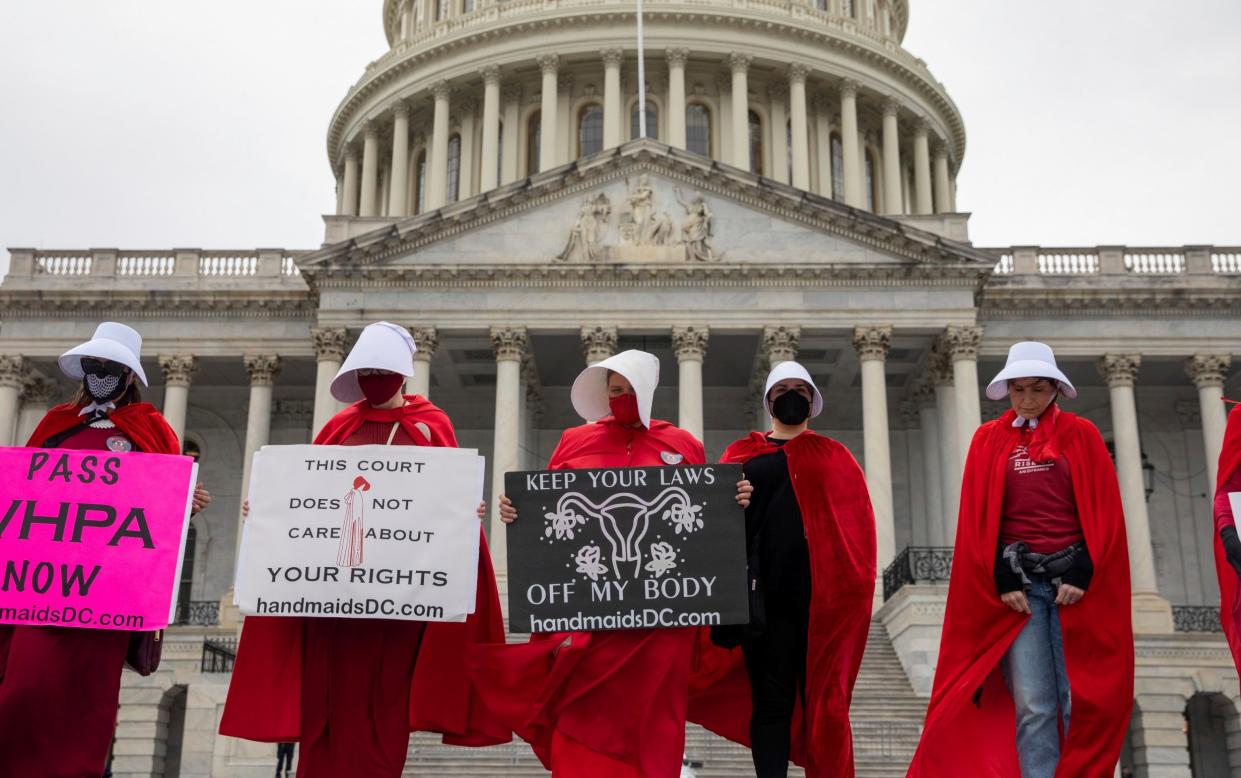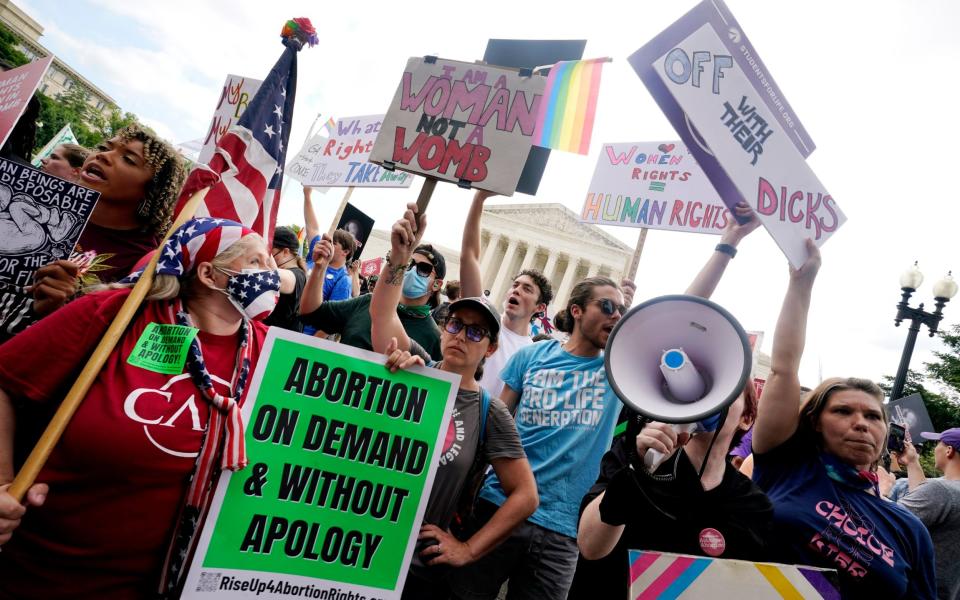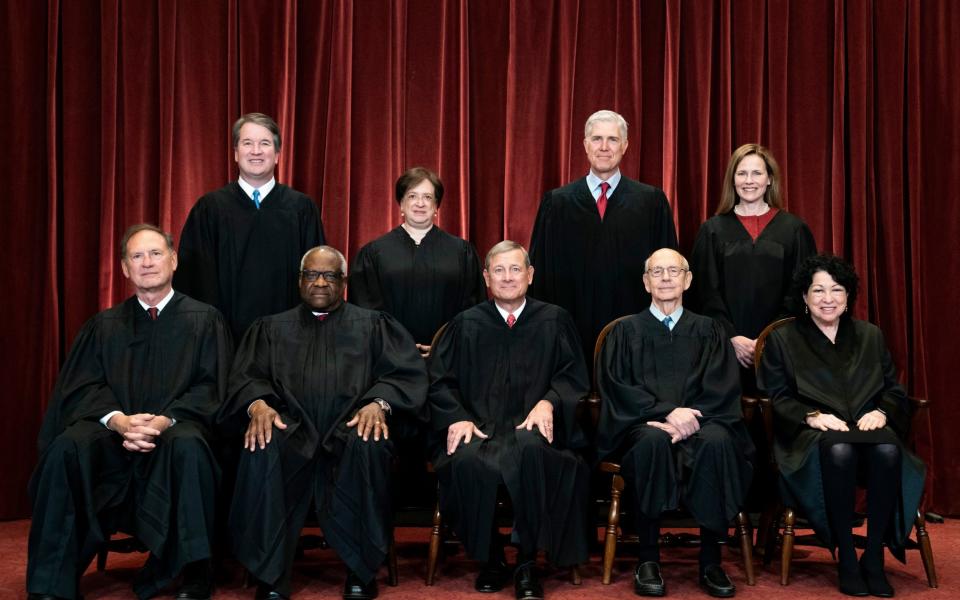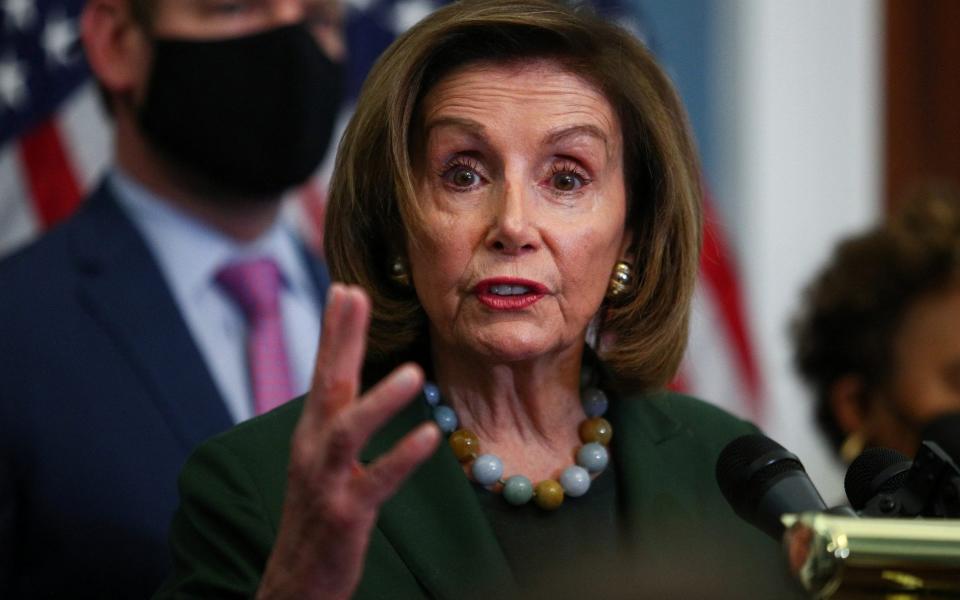Roe v Wade: US Supreme Court overturns landmark abortion ruling

- Oops!Something went wrong.Please try again later.
The US Supreme Court has overturned Roe v. Wade, the landmark ruling that enshrined the right to abortion half a century ago.
The decision has been described as a "constitutional earthquake" that will reverberate across America for years to come.
Almost instantly, abortion will be banned in 13 US states which have already introduced "trigger" laws designed to come into effect upon the Supreme Court throwing out Roe v. Wade.
In all, it is expected to pave the way for about half of the 50 US states to ban or heavily restrict abortion.
The ruling said: "We hold that Roe...must be overruled.
"The Constitution makes no reference to abortion, and no such right is implicitly protected by any constitutional provision."

It added: "Roe was egregiously wrong from the start. Its reasoning was exceptionally weak, and the decision has had damaging consequences.
"And far from bringing about a national settlement of the abortion issue, Roe [has] enflamed debate and deepened division."
There is no federal law guaranteeing the right to abortion in the United States, with rules varying from state to state.
More than a dozen Democrat-led states have their own laws guaranteeing a woman's right to choose.
https://part.icle.link/tb39s9i
In 1973 the Supreme Court, in Roe v. Wade, ruled that the 14th Amendment to the US Constitution provided a fundamental right to privacy that protects a woman’s right to abortion.
A 1992 a follow-up court decision, in Planned Parenthood v. Casey, protected access to abortion until "viability," when the foetus can survive outside the womb, typically between 22 and 24 weeks of pregnancy.
The current case - Dobbs v. Jackson Women's Health Organization - was brought by the state of Mississippi, which wants to introduce restrictions, and urged the court to overturn the previous rulings.
In its decision on Friday, written by Justice Samuel Alito, the Supreme Court said: "The Constitution does not confer a right to abortion; Roe and Casey are overruled; and the authority to regulate abortion is returned to the people and their elected representatives."
Last month, a draft opinion which became public in an unprecedented leak, suggested a majority of the nine-member court intended to take that course.
There were more than 930,000 abortions in the United States in 2020, according to the latest statistics from the Guttmacher Institute.
More than 60 per cent of Americans believe abortion should remain legal in all or most cases, according to the Pew Research Center.
But the survey showed a stark political division, with 80 per cent of Democrats believing abortion should remain legal in all or most cases, compared to 35 per cent of Republicans.
The court's decision is one of the most impactful legacies of Donald Trump's presidency.
In the 2016 election campaign, Mr Trump vowed to nominate Supreme Court justices who would be prepared to strike down Roe v. Wade.
Mr Trump, in one term, was able to nominate three such justices, giving the court a 6-3 conservative majority.
All three of the justices he nominated - Neil Gorsuch, Brett Kavanaugh and Amy Coney Barrett - voted to overturn Roe v. Wade.
So did Clarence Thomas, who was nominated by President George H. W. Bush.
The three Supreme Court justices appointed by Democrat presidents - Stephen Breyer, Sonia Sotomayor and Elena Kagan - all dissented.
They wrote: "With sorrow for this court - but more, for the many millions of American women who have today lost a fundamental constitutional protection - we dissent."

The specific case the Supreme Court was deciding on was whether a Republican-backed Mississippi law banning abortion after 15 weeks was constitutional.
The court upheld the Mississippi law by a 6-3 majority.
As part of the case the justices were also able to rule on whether Roe v. Wade was constitutional.
By a majority of 5-4 they voted to overturn Roe v. Wade.
Chief Justice John Roberts, writing separately to the other justices, said the Mississippi law should be upheld.
But he said he would not have taken the additional step of erasing Roe v. Wade.
Nancy Pelosi, the Democrat House Speaker, attacked what she called a "Trumpian Supreme Court".
She said: “This cruel ruling is outrageous and heart-wrenching. But make no mistake, the rights of women and all Americans are on the ballot this November."
She added; "The harm is endless. To women this is such an insult. It's a slap in the face to women. This is deadly serious. It's about contraception, IVF, family planning, that will all spring from their decision today."

Mitch McConnell, the Republican leader in the Senate, said the ruling was "courageous and correct" and a "historic victory for the Constitution".
He said: “Millions of Americans have spent half a century praying, marching, and working toward today’s historic victories for the rule of law and for innocent life. I have been proud to stand with them throughout our long journey and I share their joy today. The Court has corrected a terrible legal and moral error."
He added: "For 50 years, states have been unable to enact even modest protections for unborn children. More than 90 per cent of Europe restricts abortion on demand after 15 weeks, but every state in America has been forced to allow it more than a month past that, after a baby can feel pain, yawn, stretch, and suck his or her thumb
"Judicial activists declared that every state had to handle abortion like China and North Korea, and no state could handle it like France or Germany. Not anymore. Now the American people get their voice back."

